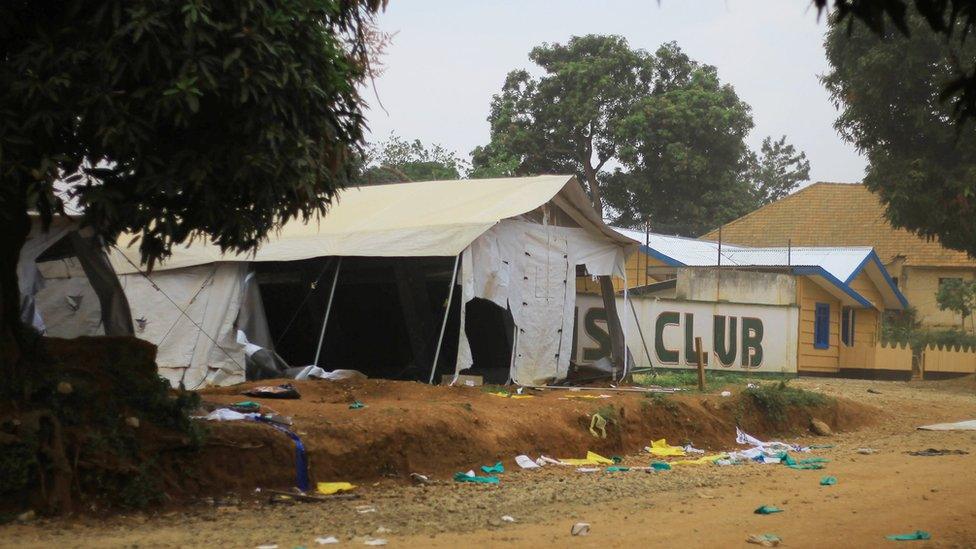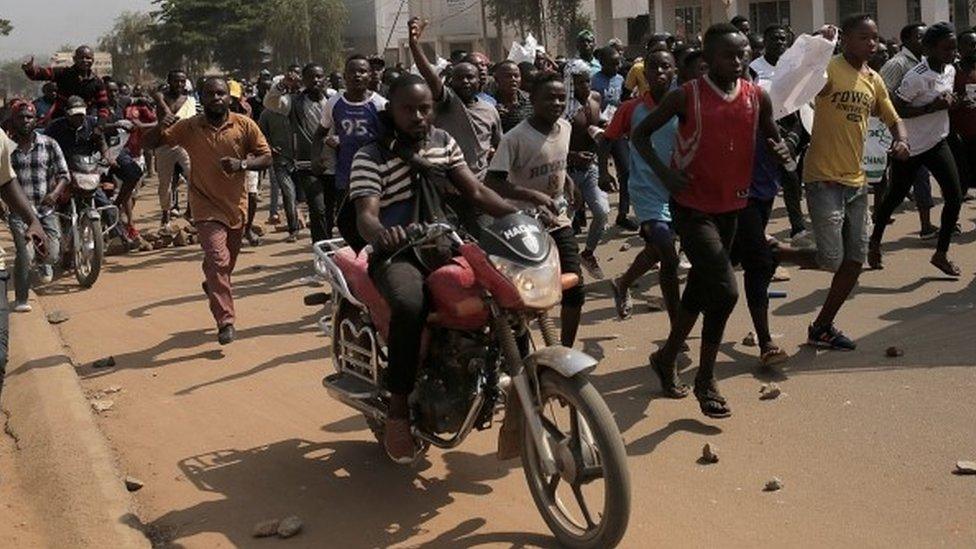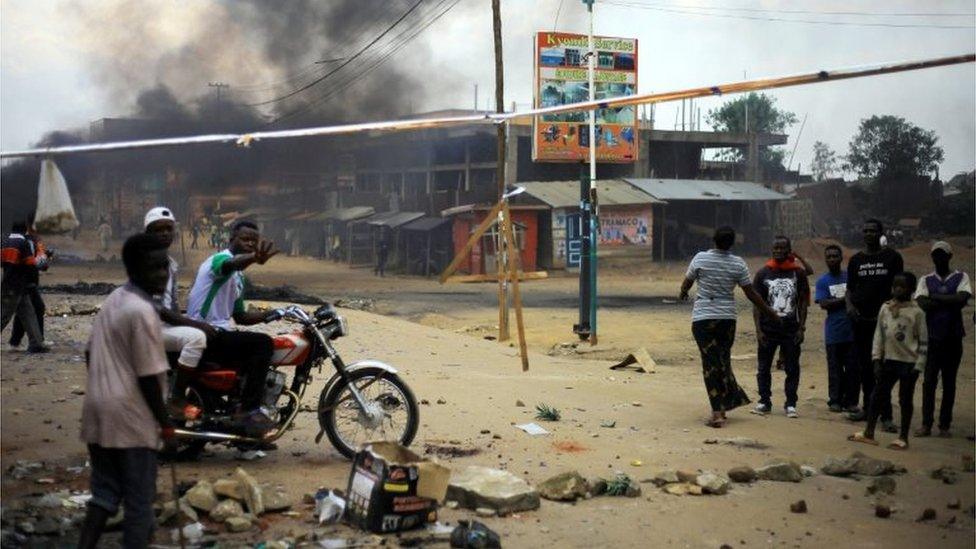DR Congo election: Protesters attack Ebola centre in Beni
- Published

Protesters ransacked the Ebola assessment centre and took chairs and tables
Protesters angry with the postponement of Sunday's presidential election in parts of the Democratic Republic of Congo have attacked a clinic where possible Ebola cases are assessed.
The attack happened in the eastern city of Beni, one of three opposition areas where the vote has been postponed.
The electoral commission has cited the current Ebola outbreak as one of the reasons behind the postponement.
But opposition parties have accused the authorities of seeking to rig the vote.
Along with Beni, voting has been postponed until March in Butembo, also in the east and in Yumbi, which is in the west.
With President Joseph Kabila's successor due to be sworn in next month, it appears the votes of more than a million people could be discounted.
But in an interview with the BBC, Mr Kabila insisted that postponing the vote until after the final result was due to be declared was lawful.
"Don't worry, the law has catered for such issues," Mr Kabila said.
Election officials are doing everything by the book, Mr Kabila told the BBC
"I don't think there will be any major issues inasfar as the one-point-something million voters that you are talking about," he added.
DR Congo has not had a peaceful and democratic transfer of power since independence from Belgium in 1960.
Mr Kabila, who has been in office since 2001, was meant to have stepped down in 2016.
However, the election to choose his successor has been continually postponed, amid unrest and logistical difficulties in a nation with poor infrastructure.
Opposition supporters suspect Mr Kabila is trying to cling on to power. He denies the allegation and is backing former Interior Minister Emmanuel Ramazani Shadary in the election.

Opposition supporters accuse the government of trying to disenfranchise them
Meanwhile, the country's foreign ministry has unexpectedly announced the expulsion of European Union ambassador Bart Ouvry, saying he has 48 hours to leave.
For weeks the government has been criticising the EU's decision to renew sanctions against Congolese officials, saying these are interfering with the electoral process in the country.
One of those affected by the sanctions, former Interior Minister Emmanuel Ramazani Shadary, is now running for president. He was first sanctioned in 2017 for human rights violations.
What happened at the Ebola centre?
Some people inside the Ebola assessment centre fled after it was attacked, a witness told the BBC.
The police then arrived and fired shots in the air to disperse the crowd, the witness added.
During the attack, some tents were burnt down and tables and chairs were stolen, health ministry spokeswoman Jessica llunga told the BBC.
Of the 21 who fled the centre, 17 had tested negative for Ebola once and were doing a second test while four others were doing a test for the first time, she added.
Eleven of those who fled later returned but were "traumatised" by the attack, authorities said.
"They came back because they understand that fast and adequate care will increase their chance of survival if they prove to be infected by the Ebola virus," a health ministry statement said.
Beni has been badly hit by the Ebola outbreak in the east of the country, which has killed more than 300 people since August.

The opposition says the credibility of the poll is in doubt
In Goma, the main city in eastern DR Congo and also an opposition stronghold, crowds blocked a road in the Majengo neighbourhood and around the university, the BBC's Gaius Kowene reports from the scene.
Anti-riot police were positioned at some street corners in Majengo, and protesters retreated after tear gas was fired, he adds.
There were also protests in Butembo. No demonstrations have been reported in Yumbi.

Is it legal to delay voting in some areas?
By Louise Dewast, BBC Africa, Kinshasa
The electoral commission said it consulted "relevant parties" before taking the decision, but declined to give details.
Constitutional expert Tresor Makunya told the BBC that only the Constitutional Court - not the electoral commission - can impose limitations on the right to vote.
The postponement of the election in key constituencies will impact on its credibility, he added.
No opposition party has as yet challenged the decision in court, either because they have little trust in the legal process or because they fear it could lead jeopardise the entire poll.
In DR Congo, only presidential candidates can challenge the results of an election in court. Some, like Jacques Ndjoli, a constitutional law professor and an opposition lawmaker, said it would be pointless to do that.
"The court has never issued a ruling that goes against the interest of those in power. I don't see why civil society or opposition parties would go and bring a challenge to the Constitutional Court considering the judges are allies of Mr Kabila," he added.

So why has voting been delayed in the three areas?
In Yumbi, at least 80 people were killed earlier this month and thousands have fled to neighbouring Congo-Brazzaville amid violence triggered by a dispute over where to bury a traditional chief.
While Beni has been affected by the Ebola outbreak, nearby Butembo has seen attacks on civilians attributed to a Ugandan Islamist militia, the Allied Democratic Forces.
Opposition supporters accused the government of attempting to disenfranchise them, and have vowed to continue with protests to force the electoral commission to reverse its decision.
Moise Katumbi, an exile who is supporting opposition candidate Martin Fayulu, said the postponement was "unjustifiable" and showed that "the regime wants to be in power forever to continue its pillage".
Allow X content?
This article contains content provided by X. We ask for your permission before anything is loaded, as they may be using cookies and other technologies. You may want to read X’s cookie policy, external and privacy policy, external before accepting. To view this content choose ‘accept and continue’.
What other issues have there been?
On 21 December, the electoral commission said the vote was being delayed by another week, after admitting that it was not ready. The decision was condemned by opposition politicians.
A delay in delivering voting materials to polling sites after a fire was behind the postponement, officials said.
DR Congo's journey into chaos
The blaze destroyed more than two-thirds of the electronic voting machines allocated for the capital Kinshasa, where four million people live, an official said.
About 40 million people have registered to vote in an election which is expected to be a tight race between Mr Shardary, Mr Fayulu and Felix Tshisekedi, the son of the late veteran opposition leader Etienne Tshisekedi.
Meanwhile the government accused Mr Fayulu of instigating election violence. Mr Fayulu's campaign has rejected the charge.